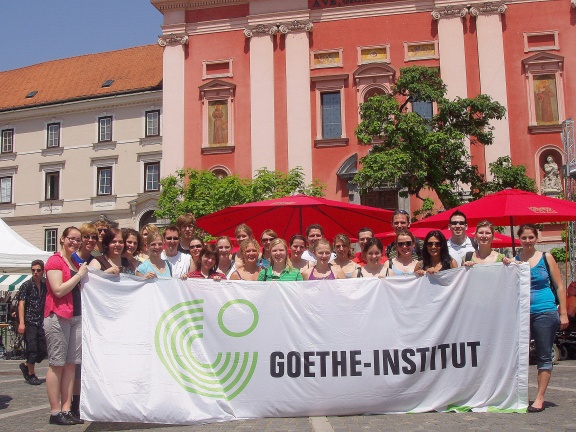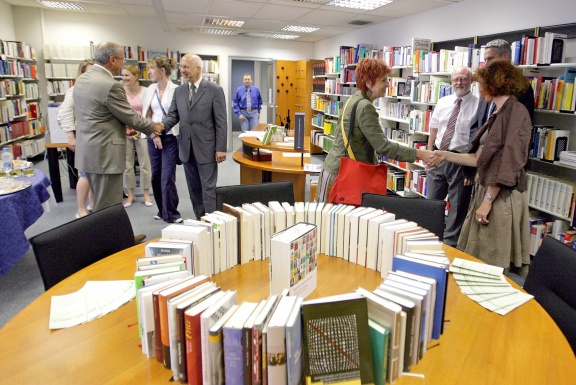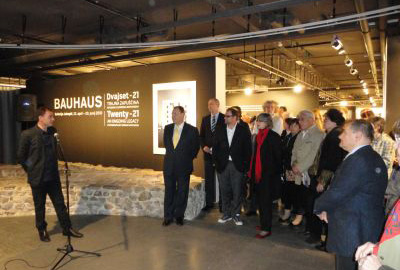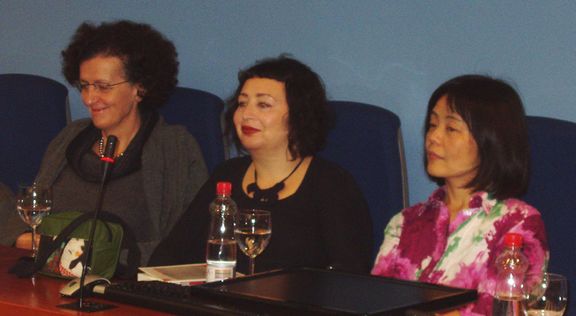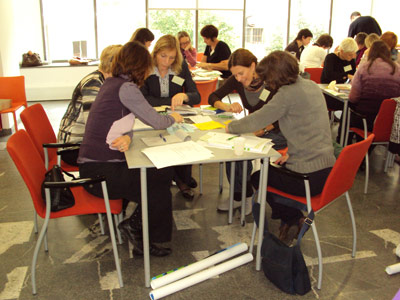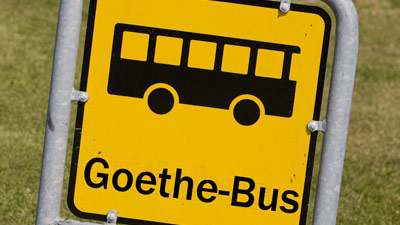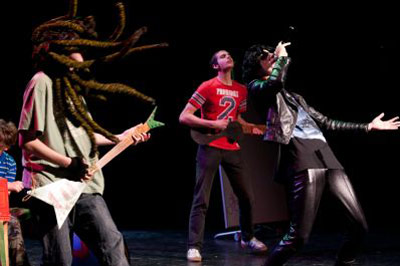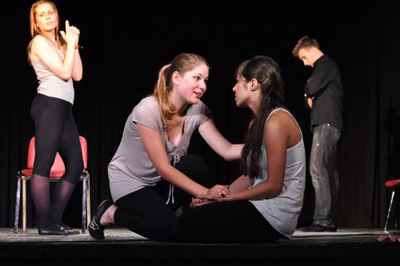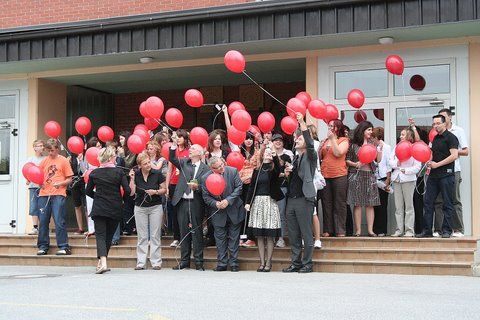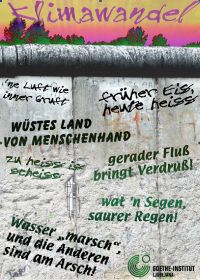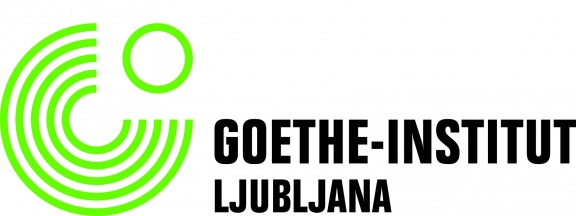Difference between revisions of "Goethe-Institut Ljubljana"
(social media corr) |
(mwtool_article) |
||
| (13 intermediate revisions by 2 users not shown) | |||
| Line 19: | Line 19: | ||
| role = Director | | role = Director | ||
| telephone = 386 (0) 1 300 0317 | | telephone = 386 (0) 1 300 0317 | ||
| − | | email = | + | | email = uwe.reissig@goethe.de |
| website = | | website = | ||
}} | }} | ||
{{Contact | {{Contact | ||
| − | | name = | + | | name = Urban Šrimpf |
| role = Cultural Programmes Coordinator | | role = Cultural Programmes Coordinator | ||
| telephone = 386 (0) 1 300 0314 | | telephone = 386 (0) 1 300 0314 | ||
| − | | email = | + | | email = urban.srimpf@goethe.de |
}} | }} | ||
| accounts = | | accounts = | ||
| Line 36: | Line 36: | ||
{{Teaser| | {{Teaser| | ||
| − | + | The [[Goethe-Institut Ljubljana]], established in [[established::2004]], is the official cultural institute of the Federal Republic of Germany in Slovenia, a part of the globally operating Goethe-Institut network. The aim of its cultural and educational programmes is to promote intercultural dialogue and cultural participation, supporting the development of civil society structures and global mobility. | |
| − | + | Since June 2017, the Goethe-Institut Ljubljana has been housed at the large premises in the vicinity of the Ljubljana city centre, at Mirje 12. The programme consists of exhibitions, film screenings, concerts, workshops, readings and talks all typically by or with German-speaking authors and all with the aim of linking the German and Slovene cultural scenes. The fundamental method of the Goethe-Institut is intercultural dialogue based on partnership cooperation. | |
| − | Goethe-Institut Ljubljana is a member of [[EUNIC Slovenia]], a network involving several European cultural institutions promoting intercultural dialogue, mobility, early language learning, and multilingualism. | + | The Goethe-Institut Ljubljana is a member of [[EUNIC Slovenia]], a network involving several European cultural institutions promoting intercultural dialogue, mobility, early language learning, and multilingualism. |
| + | }} | ||
| − | |||
| − | The | + | == Mission == |
| + | |||
| + | The Goethe Institute worldwide network of cultural offices of the Federal Republic of Germany fosters international cultural cooperation and knowledge of the German culture and language abroad. Information cultural centres, reading rooms and libraries, discussion forums diverse printed and AV publications convey a current image of Germany and promote the international discourse on key issues of the increasingly globalised society. | ||
| + | |||
| + | == Partnerships and funds, criteria and topics == | ||
| + | |||
| + | The Goethe-Institute works on the basis of partnership cooperation. Particular importance is given to the joint development of ideas and dialogue from the very incentive of the project. The events are planned together and carried out in a partnership-based division of labour from the idea through the discussion of various formats and forms of events, the selection of artists, ensembles and speakers to financing, management and organisation. Interested organisations are encouraged to communicate their ideas and plans as early as possible so that mutual interests and contributions to the content, promotion, and co-funding can be taken into account. The Goethe-Institute is neither a commercial organiser nor a sponsor: financial contributions to projects that have been planned in advance without the Goethe-institute participation are only eligible under restricted conditions. | ||
| − | + | The focus is not only on current topics, information and contents but also on lively, sustainable contacts. The aim is to bring people together and contribute to the formation of international networks. The topics of interest are the development of the contemporary cultural scene as well as cultural heritage in and from Germany; Germany, Slovenia and Europe – society, knowledge, history, cultural diversity and perspectives of the neighbourhood; and German as a foreign language in a Europe of multilingualism. | |
| − | |||
| − | + | ==Cultural cooperation == | |
| + | The Goethe-Institute takes up trends in Germany and promotes international cultural cooperation, also through cultural events and festival contributions in the fields of film, dance, music, theatre, exhibitions, literature and translation. | ||
| + | They are interested in cooperation with partners all over Slovenia, not only in the urban centres. | ||
| − | + | The cooperation project ''Luther/Trubar'' (2017) placed Martin Luther in the context of the European Reformation and compared him with [[Primož Trubar]], the Slovenian pedant. Eight phrases by Luther as well as poems by Trubar, provided a starting point for the musical explorations of composers [[Uroš Rojko]], [[Vito Žuraj]], Iris ter Schiphorst, Mark Andre, Detlef Heusinger, Peter Strahovnik and [[Luka Juhart]], their works being a musical extension of the exhibition on Luther. Visitors had an opportunity to listen to Ensemble Experimental and SWR Experimentalstudio from Freiburg at four locations in the [[Ljubljana Castle]]. | |
| − | The [[ | + | ''The Exchange of Dramaturgs'' is another platform through which [[Oliver Frljić]]/[[Mladinsko Theatre]] collaborated with Gorki Theater in Berlin. The awarded performance collective She She Pop from Berlin opened the [[City of Women International Festival of Contemporary Arts]] in October 2019. |
| − | + | In 2019, on the occasion of the Centenary of the Bauhaus School, a line of events and discussions were organised at the Goethe Institute in Ljubljana. In 2010, the Goethe-Institute supported the multidisciplinary exhibition ''Bauhaus Twenty-21 (Architecture, Design, Photography)'' set up by Foto+Synthesis at the [[Jakopič Gallery]], [[Museum and Galleries of Ljubljana]]. | |
| − | |||
| − | The | + | The [[Embassy of the Republic of Germany in Slovenia]] and the Goethe-Institut Ljubljana cooperated closely in preparing the ''German Month'' for the [[Maribor, European Capital of Culture 2012]] programme. In 2025, the title of the ECoC will be held by a selected city in Slovenia and in Germany. Cooperation with the candidate cities is in view (Nürnberg and Dresden / Zittau / Chemnitz). |
| − | |||
==German language and educational activities == | ==German language and educational activities == | ||
| − | Since 2007 the Goethe-Institut Ljubljana | + | Since 2007 the Goethe-Institut Ljubljana promotes multilingualism in Slovenia, offering German language courses and a comprehensive examination programme. It sets internationally recognised standards in German as a foreign language teaching and organises workshops and seminars for teachers of the German language, develop teaching materials and participate in scientific research and language policy initiatives. They cooperate with public and private schools as well as faculties. |
| + | |||
| + | In the field of education, the Goethe-Institut Ljubljana cooperates with Slovene ministries and schools, [[Educational Research Institute (ERI)]], organising advanced training for teachers of the German language and many further programmes. | ||
| + | |||
| + | |||
| + | == Fabjan Hafner Translation Award == | ||
| + | |||
| + | The [[Fabjan Hafner Translation Award]] for translation from Slovenian into German was founded in 2017 by Goethe-Institut Ljubljana, in cooperation with the Musil Institute in Klagenfurt in Austria and the Literary Colloquium Berlin. | ||
| − | |||
| − | + | == PASCH (''Schulen: Partner der Zukunft'') == | |
| − | + | The promotion of German language also includes the excellence initiative PASCH (''Schulen: Partner der Zukunft'') of the Federal Republic of Germany. The elementary school in Beltinci, Slovenia, has become the Slovenian PASCH-School. In 2010, the theatre-project kulturabend.de was carried out in cooperation with five Slovene Schools and one Hungarian School giving young people the opportunity to present their German language skills in Beltinci. In another project, the Goethe-Bus "German on Tour" visited teachers and pupils at their schools in the Primorska region of Slovenia and provided them with information about Germany and the German language. Participants were invited to join talks and games and explore a multimedia-based bus. | |
| − | + | ==History: German Reading Room and Library== | |
| − | + | The Goethe-Institut Ljubljana was established in [[established::2004]], expanding the programme activities of the former "German Reading Room", opened in 1995 with an aim of offering a rich variety of contemporary German-language literature for free. The Reading Room was later renamed into the German Library (''Nemška knjižnica'') that was founded under the auspices of the [[Goethe-Institut Ljubljana|Goethe-Institut]] and co-funded by the [[Ministry of Culture]] of Slovenia. Up to 2015, the German Library was an independent unit of the [[Central Technological Library, University of Ljubljana]], where related small-scale cultural and informative events took place. | |
| − | + | Today, the collection of the former German Library that consists of over 5,000 books, including titles dedicated to German architecture, design, literary theory, humanities and social sciences plus some German magazines to which the library subscribes, makes up a part of the [[Oton Župančič Library]], in which a series of discussions on new books in German language takes place under the title ''Buecher ueber die man spricht''. | |
==See also== | ==See also== | ||
* [[Embassy of the Republic of Germany in Slovenia]] | * [[Embassy of the Republic of Germany in Slovenia]] | ||
* [[EUNIC Slovenia]] | * [[EUNIC Slovenia]] | ||
| − | * [[ | + | * [[Fabjan Hafner Translation Award]] |
== External links == | == External links == | ||
| − | * [https://www.goethe.de/ins/si/de/index.html | + | * [https://www.goethe.de/ins/si/de/index.html Goethe-Institut Ljubljana website] (in Slovenian and German) |
* [http://www.pasch-net.de/deindex.htm PASCH Schulen: Partner der Zukunft network] | * [http://www.pasch-net.de/deindex.htm PASCH Schulen: Partner der Zukunft network] | ||
| − | |||
{{Gallery}} | {{Gallery}} | ||
| − | |||
| − | |||
[[Category:Support services]] | [[Category:Support services]] | ||
[[Category:International cultural centres]] | [[Category:International cultural centres]] | ||
| + | [[Category:Germany]] | ||
[[Category:Maribor, European Capital of Culture 2012]] | [[Category:Maribor, European Capital of Culture 2012]] | ||
[[Category:Culturesi Press & Art Studios, June 2012]] | [[Category:Culturesi Press & Art Studios, June 2012]] | ||
| + | [[Category:Funding,_professional_and_support_services]] | ||
Latest revision as of 01:49, 19 February 2021
Mission
The Goethe Institute worldwide network of cultural offices of the Federal Republic of Germany fosters international cultural cooperation and knowledge of the German culture and language abroad. Information cultural centres, reading rooms and libraries, discussion forums diverse printed and AV publications convey a current image of Germany and promote the international discourse on key issues of the increasingly globalised society.
Partnerships and funds, criteria and topics
The Goethe-Institute works on the basis of partnership cooperation. Particular importance is given to the joint development of ideas and dialogue from the very incentive of the project. The events are planned together and carried out in a partnership-based division of labour from the idea through the discussion of various formats and forms of events, the selection of artists, ensembles and speakers to financing, management and organisation. Interested organisations are encouraged to communicate their ideas and plans as early as possible so that mutual interests and contributions to the content, promotion, and co-funding can be taken into account. The Goethe-Institute is neither a commercial organiser nor a sponsor: financial contributions to projects that have been planned in advance without the Goethe-institute participation are only eligible under restricted conditions.
The focus is not only on current topics, information and contents but also on lively, sustainable contacts. The aim is to bring people together and contribute to the formation of international networks. The topics of interest are the development of the contemporary cultural scene as well as cultural heritage in and from Germany; Germany, Slovenia and Europe – society, knowledge, history, cultural diversity and perspectives of the neighbourhood; and German as a foreign language in a Europe of multilingualism.
Cultural cooperation
The Goethe-Institute takes up trends in Germany and promotes international cultural cooperation, also through cultural events and festival contributions in the fields of film, dance, music, theatre, exhibitions, literature and translation. They are interested in cooperation with partners all over Slovenia, not only in the urban centres.
The cooperation project Luther/Trubar (2017) placed Martin Luther in the context of the European Reformation and compared him with Primož Trubar, the Slovenian pedant. Eight phrases by Luther as well as poems by Trubar, provided a starting point for the musical explorations of composers Uroš Rojko, Vito Žuraj, Iris ter Schiphorst, Mark Andre, Detlef Heusinger, Peter Strahovnik and Luka Juhart, their works being a musical extension of the exhibition on Luther. Visitors had an opportunity to listen to Ensemble Experimental and SWR Experimentalstudio from Freiburg at four locations in the Ljubljana Castle.
The Exchange of Dramaturgs is another platform through which Oliver Frljić/Mladinsko Theatre collaborated with Gorki Theater in Berlin. The awarded performance collective She She Pop from Berlin opened the City of Women International Festival of Contemporary Arts in October 2019.
In 2019, on the occasion of the Centenary of the Bauhaus School, a line of events and discussions were organised at the Goethe Institute in Ljubljana. In 2010, the Goethe-Institute supported the multidisciplinary exhibition Bauhaus Twenty-21 (Architecture, Design, Photography) set up by Foto+Synthesis at the Jakopič Gallery, Museum and Galleries of Ljubljana.
The Embassy of the Republic of Germany in Slovenia and the Goethe-Institut Ljubljana cooperated closely in preparing the German Month for the Maribor, European Capital of Culture 2012 programme. In 2025, the title of the ECoC will be held by a selected city in Slovenia and in Germany. Cooperation with the candidate cities is in view (Nürnberg and Dresden / Zittau / Chemnitz).
German language and educational activities
Since 2007 the Goethe-Institut Ljubljana promotes multilingualism in Slovenia, offering German language courses and a comprehensive examination programme. It sets internationally recognised standards in German as a foreign language teaching and organises workshops and seminars for teachers of the German language, develop teaching materials and participate in scientific research and language policy initiatives. They cooperate with public and private schools as well as faculties.
In the field of education, the Goethe-Institut Ljubljana cooperates with Slovene ministries and schools, Educational Research Institute (ERI), organising advanced training for teachers of the German language and many further programmes.
Fabjan Hafner Translation Award
The Fabjan Hafner Translation Award for translation from Slovenian into German was founded in 2017 by Goethe-Institut Ljubljana, in cooperation with the Musil Institute in Klagenfurt in Austria and the Literary Colloquium Berlin.
PASCH (Schulen: Partner der Zukunft)
The promotion of German language also includes the excellence initiative PASCH (Schulen: Partner der Zukunft) of the Federal Republic of Germany. The elementary school in Beltinci, Slovenia, has become the Slovenian PASCH-School. In 2010, the theatre-project kulturabend.de was carried out in cooperation with five Slovene Schools and one Hungarian School giving young people the opportunity to present their German language skills in Beltinci. In another project, the Goethe-Bus "German on Tour" visited teachers and pupils at their schools in the Primorska region of Slovenia and provided them with information about Germany and the German language. Participants were invited to join talks and games and explore a multimedia-based bus.
History: German Reading Room and Library
The Goethe-Institut Ljubljana was established in 2004, expanding the programme activities of the former "German Reading Room", opened in 1995 with an aim of offering a rich variety of contemporary German-language literature for free. The Reading Room was later renamed into the German Library (Nemška knjižnica) that was founded under the auspices of the Goethe-Institut and co-funded by the Ministry of Culture of Slovenia. Up to 2015, the German Library was an independent unit of the Central Technological Library, University of Ljubljana, where related small-scale cultural and informative events took place.
Today, the collection of the former German Library that consists of over 5,000 books, including titles dedicated to German architecture, design, literary theory, humanities and social sciences plus some German magazines to which the library subscribes, makes up a part of the Oton Župančič Library, in which a series of discussions on new books in German language takes place under the title Buecher ueber die man spricht.
See also
External links
- Goethe-Institut Ljubljana website (in Slovenian and German)
- PASCH Schulen: Partner der Zukunft network




